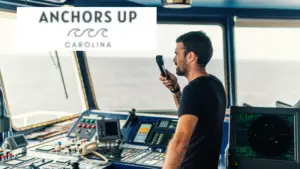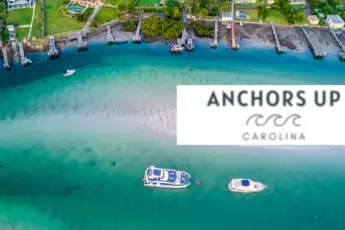One of the most important pieces of safety equipment aboard a vessel is the VHF radio. As a captain, I used the radio consistently for various tasks. The tasks included making passing agreements with vessels, requesting dockage, receiving weather updates, and more. Importantly, one of the main reasons to do a radio check is to make sure your VHF is working properly in the event of an emergency. The radio is a resource to call for help. For this reason, you need to know how to ask for a VHF radio check.
What Is A VHF Radio Check
A VHF radio check is testing the radio to ensure that it both sends and receives transmissions. For the most part operators test the radio before departing the dock.
There are a multitude of things that go wrong with a VHF radio which includes, power to the unit, the antenna, microphone, and more. The VHF test will alert you to a problem so it can be diagnosed and fixed before going boating.
How To Ask For A VHF Radio Check
The next time that you need to complete a radio check for your VHF it is important to follow the steps below.
Make Sure The Radio Is Powered On
The first step in the process is to make sure that the marine radio is in the on position. However, in order to turn it on you may need to flip a switch at the helm in addition to depressing the power button on the VHF.
Once the radio is on, turn up the volume and turn the squelch dial until you hear static at a sufficient volume. Remember to lower the squelch to end the static sound.
Select The Channel
As a captain, I always performed my radio checks on channel 16. Channel 16 is used to hail other vessels and the US Coast Guard in the event of an emergency. When you perform your radio check, set the dial to channel 16.
Importantly, stay on track when you’re making the test call.
Depress The Microphone And Speak
Once you’re tuned into 16, depress the microphone button and speak. While speaking, don’t mumble or race when saying, “radio check radio check this is (the name of your vessel).” Lastly, say “over” and release the button.
Listen For A Response
For the most part, you’ll hear a response saying “loud and clear” if the transmission was heard. Remember to keep listening so that you do not miss a response. In the event you do not receive a response, repeat the radio check call.
End The Conversation
Once you have heard a response to your radio check, I like to end the interaction by saying, “Roger, thank you”. At that point, you no longer need to continue to speak with fellow boaters via the radio.
Lastly, you don’t want to clog up the channel, preventing other people from communicating when needed. Keep your radio check brief.
Don’t Go Boating Until The VHF Radio Issue Is Addressed
As a captain, I was miles from shore, well out of cell phone service range on a consistent basis. However, even if you’re in cell phone range, the VHF should be your first resource for help.
Keep in mind, you can make a call on your phone but it is not the same as using a VHF. The VHF broadcasts to a multitude of vessels that are directly within your area. Remember VHF’s don’t cover long distances. You’ll catch the attention of a boat nearby instead of calling someone on the shoreline.
Always be sure to fix the marine radio before departing the dock. I have heard plenty of distress calls while I’ve been out on the water. Unfortunately, bad things happen when you least expect it.
Use Your VHF Radio To Your Advantage
Unfortunately, recreational boaters often overlook all of the benefits of a VHF radio. To start, there is typically a fishing channel where anglers talk about where they are fishing and what they are catching.
Secondly, you can always get the most up to day marine forecast by dialing into the marine forecast. Keep up to speed on ever changing conditions.
Lastly, avoid maritime hazards by listening to channel 16, which broadcasts concerns such as floating objects, navigation aid malfunctions, and more.
Ask For A VHF Radio Check
Without a doubt, you will need to request a VHF radio check before departing the dock. Keep your family and friends safe by making sure that your marine radio is fully operational. I use a VHF on a consistent basis and can tell you that it is highly beneficial; therefore, you want to keep it in good working condition.







